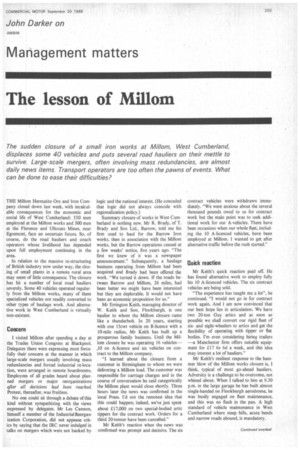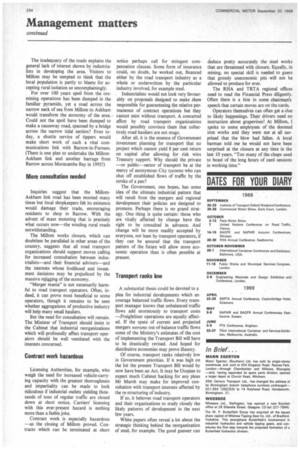Management matters
Page 257

Page 258

If you've noticed an error in this article please click here to report it so we can fix it.
The lesson of Millom
The sudden closure of a small iron works at Millom, West Cumberland, displaces some 40 vehicles and puts several road hauliers on their mettle to survive. Large-scale mergers, often involving mass redundancies, are almost daily news items. Transport operators are too often the pawns of events. What can be done to ease their difficulties?
THE Millom Hermatite Ore and Iron Company closed down last week, with incalculable consequences for the economic and social life of West Cumberland: 550 men employed at the Millom works and 300 men at the Florence and Ul'coats Mines; near Egremont, face an uncertain future. So, of course, do the road hauliers and coach operators whose livelihood has depended upon full employment continuing in the area.
In relation to the massive re-structuring of British industry now under way, the closing of small plants in a remote rural area may seem of little consequence. The closure has hit a number of local road hauliers severely. Some 40 vehicles operated regularly from the Millom works, many of them specialized vehicles not readily converted to other types of haulage work. And alternative work in West Cumberland is virtually non-existent.
Concern
I visited Millom after spending a day at the Trades Union Congress at Blackpool. Delegates there were expressing most forcefully their concern at the manner in which large-scale mergers usually involving mass redundancies and forced industrial re-location, were arranged in remote boardrooms. Employees of all grades heard about planned mergers or major reorganizations after all decisions had been reached Protest, thereafter, was fruitless.
No one could sit through a debate of this kind without sympathizing with the views expressed by delegates. Mr Les Cannon, himself a member of the Industrial Reorganization Corporation, did not appease critics by saying that the IRC never indulged in talks on mergers which were not backed by logic and the national interest. (He conceded that logic did not always coincide with regionalization policy.) Summary closure of works in West Cumberland is nothing new. Mr R. Brady, of T. Brady and Son Ltd., Barrow, told me his firm used to haul for the Barrow Iron works, then in association with the Millom works, but the Barrow operations ceased at a few weeks' notice, five years ago. "The first we knew of it was a newspaper announcement." Subsequently, a haulage business operating from Millom had been acquired and Brady had been offered the work. "We turned it down. If the roads between Barrow and Millom, 26 miles, had been better we might have been interested but they are deplorable. It would not have been an economic proposition for us."
Mr Errington Keith, managing director of W. Keith and Son, Fiookburgh, is one haulier to whom the Millom closure came like a thunderbolt. In 20 years, starting with one I5cwt vehicle on B-licence with a 10-mile radius, Mr Keith has built up a prosperous family business. Until the Miltom closure he was operating 16 vehicles— I0 on A-licence and six vehicles on contract to the Millom company.
"I learned about the closure from a customer in Birmingham to whom we were delivering a Millom load. The customer was responsible for carriage charges and in the course of conversation he said categorically the Millom plant would close shortly. Three hours later the news was confirmed in the local Press. I'd not the remotest idea that this could happen; indeed, we've just spent about £17,000 on two special-bodied artic tippers for the contract work. Orders for a third 20-tonner have been cancelled."
Mr Keith's reaction when the news was confirmed was prompt and decisive. The six contract vehicles were withdrawn immediately. "We were anxious about the several thousand pounds owed to us for contract work but the main point was to seek additional work for our A-vehicles. There have been occasions when our whole fleet, including the 10 A-licenced vehicles, have been employed at Millom. I wanted to get, after alternative traffic before the rush started."
Quick reaction
Mr Keith's quick reaction paid off. He has found alternative work to employ fully his 10 A-licenced vehicles. The six contract vehicles are being sold.
"The experience has taught me a lot", he continued. "I would not go in for contract work again. And I am now convinced that our best hope lies in articulation. We have two 20-ton Guy artics and as soon as possible we shall convert our rigid fleet of sixand eight-wheelers to artics and get the flexibility of operating with tipper or flat bodies. I'm even considering hiring trailers —a Manchester firm offers suitable equipment for 117 6s 6d a week, and this idea may interest a lot of hauliers."
Mr Keith's resilient response to the hammer blow of the Millom works closure is, I think, typical of most go-ahead hauliers. Adversity is a challenge to be overcome, not whined about. When I talked to him at 9.30 p.m. in the large garage he has built almost single-handed on Flookburgh aerodrome, he was busily engaged on fleet maintenance, and this was no flash in the pan. A high standard of vehicle maintenance in West Cumberland where steep hills, acute bends and narrow roads abound, is mandatory. The inadequacy of the roads explains the general lack of interest shown by industrialists in developing the area. Visitors to Millom may be tempted to think that the local population is partly to blame for accepting rural isolation so uncomplaininglY.
For over 100 years spoil from the oremining operations has been dumped in the familiar pyramids, yet a road across the narrow neck of sea from Millom to Askham would transform the economy of the area. Could not the spoil have been dumped to make a causeway road, spanned by a bridge across the narrow tidal section? Even today, a shuttle service of tippers would make short work of such a vital communications link with Barrow-in-Furness. (There is one plan to undertake the MillomAskham link and another barrage from Barrow across Morecambe Bay in 19951) More consultation needed Inquiries suggest that the MillomAskham link road has been mooted many times but local shopkeepers felt its existence would damage their trade, encouraging residents to shop in Barrow. With the advent of mass motoring that is precisely what occurs now—the winding rural roads notwithstanding.
The Millom works closure, which can doubtless be paralleled in other areas of the country, suggests that all road transport organizations should support moves calling for increased consultation between industrialists—and their financial advisers—and the interests whose livelihood and investment decisions may be prejudiced by the massive rejigging of the economy.
"Merger mania" is not necessarily harmful to road transport operators. Often, indeed, it can prove most beneficial to some operators, though it remains to be seen whether aggregations of productive industry will help many small hauliers.
But the need for consultation will remain. The' Minister of Transport should insist in the Cabinet that industrial reorganizations which will profoundly affect transport operators should be well ventilated with the interests concerned.
Contract work hazardous Licensing Authorities, for example, who weigh the need for increased vehicle-carrying capacity with the greatest thoroughness and impartiality can be made to look ridiculous if industrial outlets yielding thousands of tons of regular traffic are closed down at short notice. Carriers' licensing with this ever-present hazard is nothing more than a feeble joke.
Contract work is especially hazardous —as the closing of Millom proved. Contracts which can be terminated at short notice perhaps call for stringent compensation clauses. Some form of insurance could, no doubt, be worked out, financed either by the road transport industry as a whole or underwritten by the particular industry involved, for example steel.
Industrialists would not look very favourably on proposals designed to make them responsible for guaranteeing the relative permanence of contract operations but they cannot exist without transport. A concerted effort by road transport organizations would possibly convince them that collectively road hauliers are not mugs.
After all, it is the essence of Government investment planning for transport that no project which cannot yield 8 per cent return on capital after allowing for risk wins Treasury support. Why should the private —or public—sector of transport be at the mercy of anonymous City tycoons who can shut off established flows of traffic by the stroke of a pen?
The Government, one hopes, has some idea of the ultimate industrial pattern that will result from the mergers and regional development their policies are designed to promote. Perhaps there is no grand strategy. One thing is quite certain: those who are vitally affected by change have the right to be consulted in advance. And change will be more readily accepted by everyone, not least by transport operators, if they can be assured that the transport pattern of the future will allow more economic operation than is often possible at present.
Transport ranks low A substantial thesis could be devoted to a plea for industrial developments which encourage balanced traffic flows. Every transport manager knows that unbalanced traffic flows add enormously to transport costs —:Freightliner operations are equally affected. If the spate of current and projected mergers worsens out-of-balance traffic flows some of the Ministry's estimates of the cost of implementing the Transport Bill will have to be drastically revised. And hoped for distributive economies may prove illusory.
Of course, transport ranks relatively low in Government priorities. If it was high on the list the present Transport Bill would by now have been an Act. It may be Utopian to expect much Cabinet backing for any pleas Mr Marsh may make for improved consultation with transport interests affected by the re-structuring of industry.
If so, it behoves road transport operators and their organizations to study closely the likely patterns of development in the next few years.
White papers often reveal a lot about the strategic thinking behind the reorganization of steel, for example. The good guesser can deduce pretty accurately the steel works that are threatened with closure. Equally, in mining, no special skill is needed to guess that grossly uneconomic pits -will not be allowed to produce for ever.
The RHA and TRTA regional offices need to read the Financial Press diligently. Often there is a hint in some chairman's speech that certain moves are on the cards.
Operators themselves can often get a clue to likely happenings. Their drivers need no instruction about grapevines! At Millom, I spoke to some employees of the doomed iron works and they were not at all surprised that the blow had fallen. A local barman told me he would not have been surprised at the closure at any time in the last 10 years. "Too many of the chaps used to boast of the long hours of card sessions in working time."


















































































































































































































































































































































































